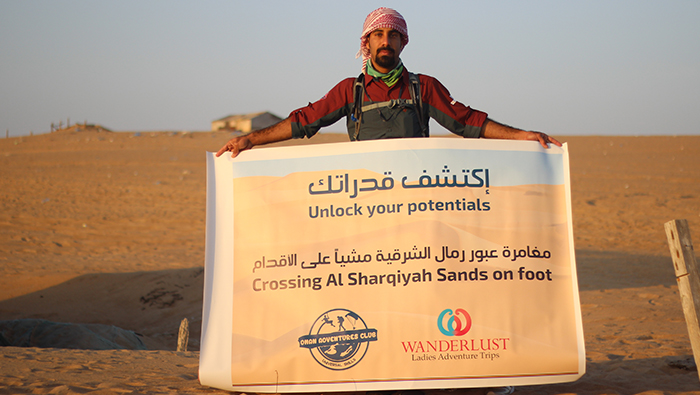
Muscat: People should not venture into the desert without carrying enough water, as underestimating the impact thirst could have on them could lead to disastrous consequences, according to Mohammed Salim Al Jahwari, who crossed the Sharqiyah Sands on foot.
The Omani, who took six days to complete the 150km journey across the desert, faced pleasant weather on the first two days, but realised in the importance of being prepared for thirst on the third day, when the heat intensified.
“The conditions on the first two days were cloudy: perfect to begin the crossing, but on the third day, the heat started to pick up during the afternoon, which means I had to change my plans, from a continuous 35km walk to one that was split into two sessions,” he recalled.
“Initially, I had to take a one hour break from 11am to noon, but on the third and fourth day, I was compelled to start earlier and stop from noon to three or four pm, after which I covered the rest of the distance.
“On day four, the heat was at its peak, so I finished all of the two litres in my bag,” he admitted. “The subsequent lack of water, and the fact that I was only walking with my socks on, made me feel the heat more and more.”
Although Mohammed was on foot, he travelled with three others who rode alongside him in a four-wheel drive to take care of his many needs, from preparing his food to organising his camp at night. Hamdoon Al Hashmi – who previously cycled across the Gulf Cooperation Council – was in charge of planning the route, while Shihab and Nooh Al Dahmani had to make sure their ride was able to safely navigate the deceptive dunes of the desert.
They had their own lessons to learn from their time out there: “I learned how to use a GPS and to navigate with it, and to understand my own location by studying the shadows around me – a most important tool in the wild,” said Hamdoon. “It was also important to understand and react to changes in weather, which might differ between one hour and the next.”
Mohammed added: “During these tough times, it is important to just be patient and focus on the walk in front of you.”
To sustain them in the desert, the group had packed plenty of light food that can last a long time without spoiling, such as an Omani bread locally called rakhal, dates, oats, rice, sweet potatoes, and lentils. Plenty of fruit, including bananas to prevent cramp and muscle soreness while walking, and oranges to provide electrolytes and keep them hydrated, were also part of their supplies.
“We packed plenty of water, because we knew that we would not be able to get help for a while, in case we’d gotten stuck,” recalled Mohammed. “Our mission was to engage youth and show them their ability to reach their potential, and spread awareness about the terrain and geographical makeup of our country.”
Taking care of themselves aside, the quartet also needed to make sure their four-wheel drive was in tip-top shape throughout. The slightest slip could lead to them getting bogged down in the dunes, with extricating themselves a time-consuming and laborious effort.
Because vehicles consume more fuel on sand, an extra jerry can of petrol had to be packed, while a GPS link-up issued by a friend who provides such services meant they could be tracked, should things go wrong, particularly since phone reception out in the desert is often non-existent. They also took an extra car battery, traction mats, and power banks for their phones and other electronic equipment.
“When we needed to go to the toilet, we’d go behind the dunes,” admitted Mohammed. “We’d only get the opportunity to shower in places where there were wells from which the local Bedouin often draw water. Other times, we’d make do with wet wipe tissues.”
Despite all the challenges and difficulties experienced in the desert, the Omani admitted his journey was worth it, thanks in generous part to what was waiting for him at the end.
“On the sixth day, I arrived home by about 10pm, and my father was waiting there for me,” he recalled. “He father used to undertake such long-distance walks, and often tells me that walking helps lead a healthy lifestyle.
“That day, we stayed up late at night, and he asked me a lot of deep questions about my experience,” Mohammed said. “That really inspired me to always strive to do better and take on tougher challenges.”